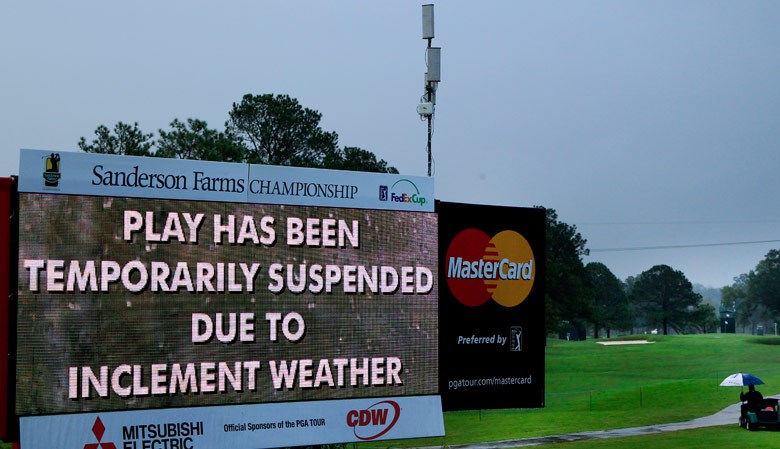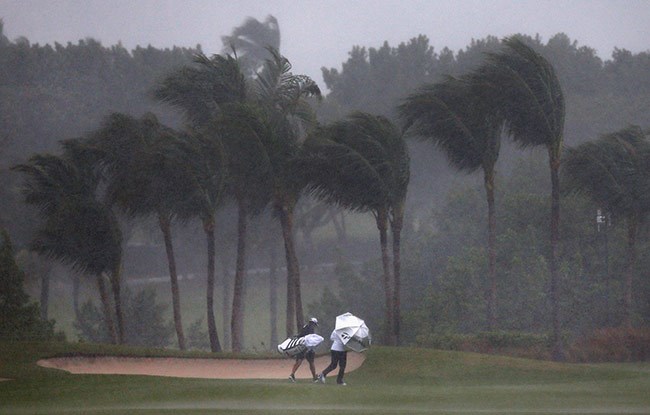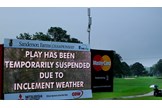How to deal with bad weather, slow play and better golfers
Published:
So, you’re playing golf this morning. You get up and look outside. It’s rainy, windy and cold. So very, very cold. Yes, it’s going to be a battle today – slow, bumpy greens, good shots blown off-course, miserable waits on the tees; and you never play well in the rain…
Hopefully you’re a bit more upbeat than that. But the above is an example of the type of narrative to which all golfers are susceptible. In other words, we create stories around the situations we’re in – and those stories can work for you, or against you.
‘What the thinker thinks, the prover proves’ is a well-known phrase. It means that if you think you’re going to struggle today, your brain will look for ways to prove it, and ultimately bring it about. Wind in your face on the first tee, your first three-putt… if your weather story is negative, your brain will use these to confirm it. Rapidly, you put yourself in a truly ineffective state of mind that makes a decent return almost impossible.
The good news is that we can use stories to create a far more resourceful and productive state. Here are three common scenarios where you might want to change your narrative.
Bad weather
As we’ve discussed, a common reaction is to find bad-weather golf unappealing, hard, a chore. A better response would be to see it as a challenge to be met, or of letting it fuel your competitive side; take a better attitude to the conditions than the rest of the field, as Jordan Spieth (right) does, and you give yourself an advantage over them.
Another great response is to adjust your expectations for the day. If you play off 12, give yourself 15 shots. Turn a long par 4 into the wind into a par 5 and the quest to make four becomes far more appealing. You can also create a strategy for the day, from the outerwear and extra gloves you pack to the knockdown shots you’ll need.
Playing against a better player
Golfers suffer here by creating stories borrowed from other sports. In tennis, cricket and football, a better opponent can have a direct effect on your performance. So the narrative we tend to create is that, because your opponent is playing a superior game, yours is diminished in comparison. In devaluing your own game, you pretty much guarantee a defeat.
A much more fruitful response would be to remind yourself that, in golf, the better player can only influence you to the degree you are focused on him. So instead, appreciate the handicap system and tell yourself that, in doing your own thing, you can become a nuisance to any good player. When you focus on yourself, use your shots, and match his good play with halves and wins, your chances of winning shoot up.
Slow play
The story we tend to create around slow play is that it’s unnecessary and irritating, that it makes it impossible to get any kind of rhythm going and generally spoils the round.
If you reach the course with these types of thoughts in mind, you are putting your attention on something out of your control, and you’ll start your round looking for signs that prove your preconceptions. Both of those will harm your focus and performance.

Nobody expects you to like slow play, but it’s quite possible to have a stance about the issue without allowing it to affect your play on a day-to-day basis. You can develop responses that limits its negative effect.
Take Ryder Cup player Stephen Gallacher. He recently revealed he recognised slow play was part of his job, and that rather than getting irritated about it, he went to see someone about adjusting his preshot routine for slow days.

Consider also that, if you ask most people why they play golf, they will talk about being outdoors, the companionship, the social side. They are still available to you on slow days, yet people typically shut them down, instead staring silently at the group ahead.
If you don’t want slow play to affect your score, find a story that shifts your focus away from it and on to your game… and leave the inquest till the 19th.






